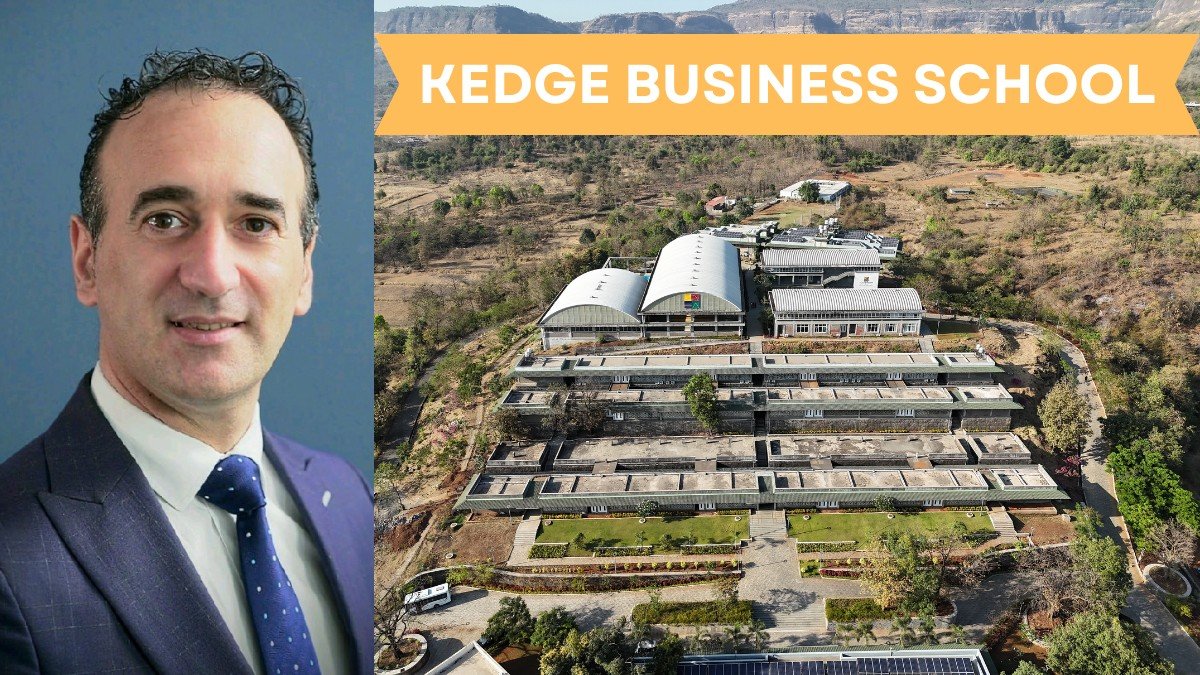From tailored academic programs and employability support to sustainability initiatives and entrepreneurship opportunities. In an exclusive interaction with The Free Press Journal, Santiago Garcia, Vice President for Strategic Development & International at KEDGE Business School, France, throws light on how the institution is shaping its offerings to attract Indian students. He also shares valuable advice for prospective Indian applicants, emphasizing the school’s triple accreditation, innovative pedagogy, and commitment to student success.
FPJ: What’s new that KEDGE Business School is offering to Indian students?
Garcia: This partnership is unique in India—a top French institution collaborating with a local university to offer a range of programs that can be completed entirely in India. We’re starting with a bachelor’s degree, and, by September 2026, we will also offer six master’s degrees. More programs will be added, including executive education and doctoral degrees. Students can start their education at Vijaybhoomi University in India and progress to a PhD or executive degree in KEDGE. While the details for doctoral and executive programs are still in the works, we expect them to be available soon.
FPJ: How do Indians students contribute to the French economy?
Garcia: France faces a lack of talent in such fields as engineering and mid-to-high management. India, the largest producer of graduates in hard sciences, is, therefore, a vital source to fill this gap. Technical students from India are instrumental to the growth and development of companies in France. In addition to hard skills, we also focus on soft skills, including social and managerial skills, which are also essential for professional success. These complement the education Indian students receive and enhance their employability.
FPJ: What does KEDGE Business School look for in Indian students when reviewing their applications?
Garcia: Excellence. We prioritise excellence and ambition over the field of study. We seek students who have shown exceptional academic progress and have a clear desire to make a difference. While we don’t focus heavily on the discipline, we value students who excel in their chosen fields and demonstrate strong ambition. If they possess these qualities, they are a good fit for us.
FPJ: How many Indian students are enrolled at KEDGE, and what is the male-to-female ratio?
Garcia: Currently, we have about 400 Indian students enrolled. This includes students from the latest intake of 200. The ratio is roughly 50-50; we don’t have a significant gender imbalance. It’s quite varied.
FPJ: What program do Indian students most commonly choose?
Garcia: We offer a range of around 20 programs, particularly master’s degrees. Students choose a variety of fields, from international business to supply chain and logistics. While most still come for master’s degrees, we’ve seen the largest growth in students opting for bachelor’s degrees.
FPJ: How does KEDGE support Indian students with accommodation & homesickness concerns?
Garcia: We provide accommodation services, particularly for Indian students. For example, in Paris, we offer our own facilities reserved for students, as finding affordable housing there can be challenging. We also help students find housing in private or public residences or even apartments. Additionally, we have dedicated career services to assist both Indian and non-Indian students in finding the right placement.
FPJ: How does KEDGE align its curriculum with the global market?
Garcia: We are in constant contact with companies, who advise our curriculum. Our real customers are the companies—we aim to create talent for society and businesses. Companies provide the latest insights, and we even have an academic unit dedicated to predicting future job trends. We don’t just react to current needs but also anticipate what companies will require in the next five to ten years.
FPJ: What employability support and opportunities does KEDGE offer its students?
Garcia: Our students have one of the highest employability rates among business schools in France. Companies recognise that KEDGE students follow a rigorous curriculum with practical applications—case studies, projects, and simulations—throughout their studies. This ensures our students are job-ready, which is what companies are looking for. Companies are confident in hiring KEDGE graduates, making it easier for them to find employment.
FPJ: Could France benefit from India’s concerns over study abroad restrictions in other countries?
Garcia: We’ve already seen this. Countries like Canada are closing up, and Australia and the UK are also becoming more restrictive. In contrast, France is increasing its efforts to attract more Indian students. President Macron expressed this ambition during his recent visit to India. France is a welcoming country, particularly for Indian students.
FPJ: What support services does KEDGE offer to help Indian students settle in France?
Garcia: It’s not difficult at all. We have a large international community at the school, and we organise integration events to help students connect. On campus, you’ll see students from India, Spain, the U.S., Latin America, and beyond, mingling naturally. We also offer student associations that organise activities from sports to gastronomy. These events help students make both local and international friends, enriching their experience at KEDGE.
FPJ: How does KEDGE support students with medical needs?
Garcia: We offer dedicated support for mental health and homesickness. Students don’t need to seek external help. As for medical care, France has one of the best healthcare systems in the world. All students are automatically enrolled in the French Social Security system, which provides access to universal healthcare from day one, free of charge. It’s not like private systems with expensive insurance and deductibles.
FPJ: How does KEDGE approach sustainability and climate?
Garcia: Sustainability is part of our DNA. We have a platform called KEDGE Impact, where we track key metrics like consumption of energy, water usage, and decrease in carbon footprint. Students will learn how to get social responsibility integrated into their future careers. They usually use public transport, or bikes, rather than cars, so it supports a sustainable lifestyle. In class, we teach sustainability, and there are student groups working on socially responsible initiatives, which students can get involved in during their time at KEDGE.
FPJ: What entrepreneurship opportunities are available to Indian students at KEDGE?
Garcia: Yes, we have an incubator, and the school offers courses on business creation, entrepreneurship, and innovation. France also supports entrepreneurship by providing entrepreneur visas. I know of one Indian student who completed a master’s degree with us, stayed in France on an entrepreneur visa, and set up his own company. We provide support for ideation, funding, and space for developing ideas. The French government also fosters this ecosystem, offering support for new companies.
FPJ: What would you advise to students applying for KEDGE Business School?
Garcia: I would advise them to live the fullest, richest life possible before even applying. Do internships, work with NGOs, do social projects, get good grades. Also get counseling from school counselors or school representatives on what career will best suit them. Students should aim to shape their preferences and pursue what truly interests them. Students need to work on their strengths. We cannot judge what we don’t see. I advise getting involved early in such activities. This will give students a strong CV upon graduation.
FPJ: How does KEDGE’s triple accreditation impact its attractiveness to Indian students?
Garcia: Triple accreditation is a distinctive marketing factor for KEDGE, placing us in the top 1% of business schools globally. When choosing an institution, students look for differentiating factors, and our triple accreditation is one of them. However, it’s not the only factor. We also have a pedagogical approach focused on “learning by doing,” which means students engage with companies, work on case studies, simulations, and role-playing. Our pedagogy is unique compared to traditional lectures where students just memorise information for exams. We also link students with companies, offer high-quality services, and maintain a strong ranking. For example, we are the number one French school in the Shanghai ranking for research in business administration. This ensures we stay on top of the latest trends, which we embed into our curriculum. This makes a significant difference compared to other schools.




